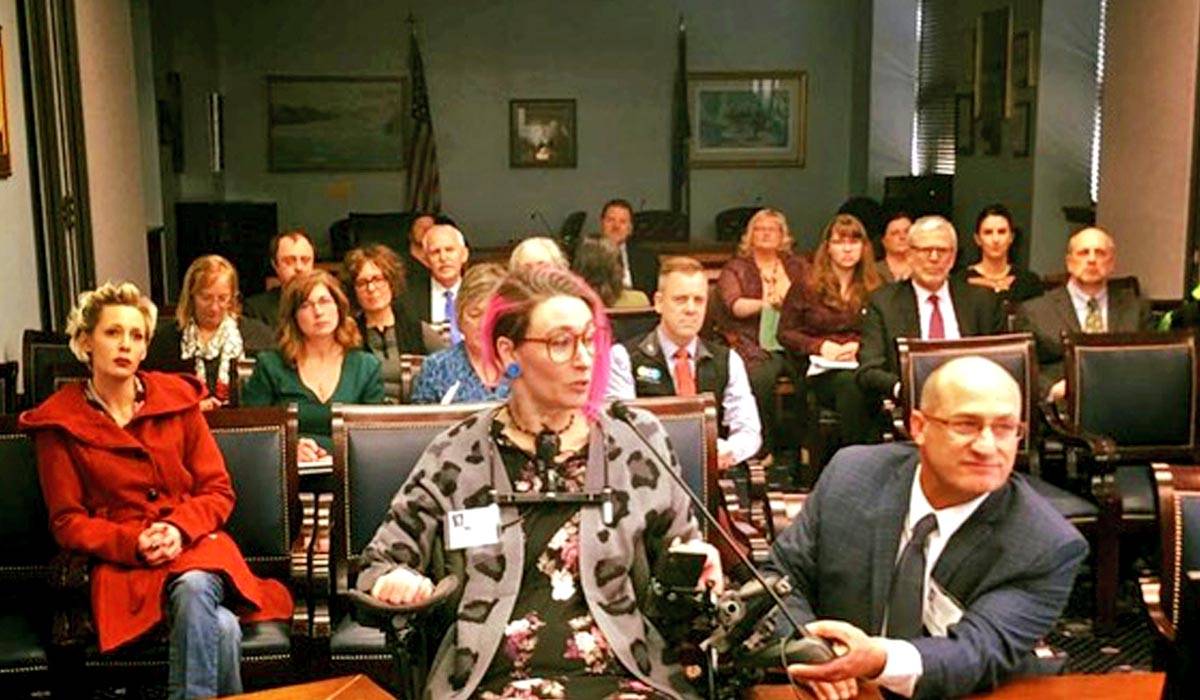Advocates are pushing for a bill that would give people with disabilities more say in state services.
Senate Bill 174, sponsored by Sen. Peter Micciche (R-Soldotna), would add language to the code dictating the Alaska Department of Health and Social Services’ role on providing services to Alaskans with disabilities. It’s a language change with no concrete service changes, but it’s a mission shift for how the department delivers services, according to advocates.
If signed into law, the bill would add language to the department’s mission statement adding more flexibility to administering services for people with disabilities, allowing “each person to participate actively, with assistance based on the person’s strengths and abilities, in managing the person’s support services so that the person can achieve a meaningful life in the person’s home, job and community.” It also adds language noting the Legislature’s support for autonomy and self-direction for people with disabilities.
“What you’re going to see is this bill is about philosophy,” Micciche told the Senate Health and Social Services Committee on Feb. 21.
Though it’s a philosophical change, it’s one praised by a variety of people in disability support work and those with disabilities. Kenai resident Maggie Winston, who chairs the Governor’s Council on Disabilities and Special Education, testified in support of the bill at the Feb. 21 meeting, saying the change provided people receiving services more self-determination.
“This vision enables person-directed care, and a person-directed culture,” she said.
“This is super important, especially for individuals that experience disabilities because it will enable us to have more control and living the life that I direct, and the life that I choose.”
Winston, who has a disability herself, provided inspiration for the bill in the first place, Micciche said.
“To me, she’s the inspiration for hearing this bill,” he said. “Although some physical limitations may seem debilitating, they are not an impairment to absolute success in one’s life.”
Lizette Stiehr, the executive director of the Alaska Association on Developmental Disabilities, also testified at the hearing in favor of the bill that a flexible system means people would have more say in which services they want to have in their lives. Different people have difference needs, and those needs change over time as they develop natural support systems, she said.
“I think some of the economic impact is when we look closely at what people would like to have in their lives, they want to be included in the community, and one of the way community inclusion happens is through unpaid or natural support,” she said.
People with disabilities receive Medicaid services through the Division of Senior and Disability Services. Until the early 1990s, the most common way to receive services was through institutional or group home support at Harborview, Alaska’s sole developmental disability institution. Since then, the state has issued waivers for people with disabilities to be able to receive home- and community-based services for their needs.
Keeping people in their communities rather than moving them to institutions is a key part of helping them to live meaningful lives, said Patrick Reinhart, the executive director for the Governor’s Council on Disabilities and Special Education, in testimony to the committee. The state has already taken steps to do so with employment for individuals with disabilities, and SB 174 is another step in that direction, he said.
“It takes a long time to make a culture change within a large system of support services like we have in Alaska,” he said “…We look at these as another one of these culture shift changes, that more and more often we’re looking to the individual for their hopes and dreams and desires.”
The Senate Committee on Health and Social Services advanced the bill with broad support on Feb. 21, with a number of cosponsors signing on in support of the effort. The bill has moved to the House of Representatives and been referred to the House Committee on Community and Regional Affairs.
The cost for the Medicaid disability waiver program has been growing steadily for the past several years. As part of the Legislature’s omnibus Medicaid rewrite, known as Senate Bill 74, passed in 2016, the DHSS began considering options to revamp the waiver program to draw more federal funding to support services. The revisions were designed to help control the growing cost of the program.
In the fiscal note attached to the bill, Division of Senior and Disability Services Director Duane Mayes noted that the bill does not require the division to implement any changes or new practices that would impact the budget.
Reach Elizabeth Earl at eearl@peninsulaclairon.com.

